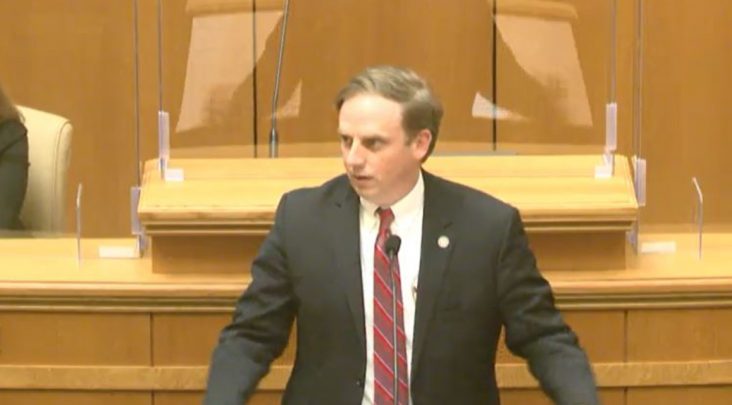House passes class protection bill after debate on return to committee fails; heads to Governor
by April 12, 2021 4:53 pm 860 views

Despite a controversial vote out of committee last week, SB 622, a bill that would provide class protections in criminal cases survived a full vote in the Arkansas House on Monday (April 12). Lead sponsor and Speaker of the House Rep. Matthew Shepherd, R-El Dorado, told members this wasn’t the bill he anticipated, but it’s one that he will defend.
The bill passed on a 65-26 House vote with five members voting present after an effort was made to send the bill back to committee. SB 622 was introduced as a compromise hate crimes bill. Arkansas is one of three states without a similar law on the books.
It now heads to Gov. Asa Hutchinson’s desk for approval. He said he planned to sign the bill into law.
“I am very pleased that SB 622 passed both chambers of the General Assembly, and I will sign the bill since passing a serious hate crime bill has been one of my high priorities. This is a stronger version of hate crime legislation than many states have, and I applaud Speaker [Matthew] Shepherd and Pro Tempore [Jimmy] Hickey for getting this done,” he said.
“While I supported a more specific version of a hate crime bill, SB 622 will provide greater penalties for anyone who targets someone because of their race, sexual orientation or gender identity. The protection provided and the increased penalties are the ultimate test, and while I preferred different language, I am confident that this bill accomplishes the objective of increased penalties for hate crimes,” Hutchinson added.
In Monday’s floor debate, Speaker Shepherd admitted to House members the bill might be too vague and might be challenged in court.
“This is an issue I had to address … It’s not a perfect bill. I haven’t seen a perfect bill yet,” he said. “It’s comprehensive. It’s substantive.”
Rep. Vivian Flowers, D-Pine Bluff, gave an impassioned plea to her colleagues to not support a bill she thinks doesn’t go far enough. One of the criticisms of other hate crimes bills that have failed is that certain groups are named and protected in the law.
Flowers noted that many pieces of legislation are passed with specific groups that are impacted. She urged legislators to admit or come to the realization that there are people who target victims based on their inclusion in a specific class that can be defined by race, ethnicity, religious or sexual orientation and others.
SB 622 is an attempt for some lawmakers to “check a box,” she said. Other arguments that the bill will attract companies and talent fall short, she added. There are specific problems that comprehensive hate crime laws could tackle.
“Why are we afraid to address the fact that some people are racist?” Flowers said. “Let’s not check a box. Let’s solve the problems that exist,” she said.
Rep. Monte Hodges, D-Blytheville, noted that several laws have been passed with specific enhancements for crimes committed against law officers.
The bill will create an “aggravating circumstance” provision that will require a criminal defendant to serve at least 80% of his or her sentence if certain motivations led to the crime.
Those criteria include if the defendant purposefully selected the victim because the victim was a member of or was associated with a recognizable and identifiable group or class who share mental, physical, biological, cultural, political, or religious beliefs or characteristics, per the bill. It must be proven that the crime was committed due to these characteristics, Shepherd said.
It’s estimated that the bill could add up to 10% on a sentence for first degree murder in the state, and it could add from 40% to 60% on other offenses. He noted that all it does is require those convicted to serve more of their sentence than has already been meted.
“We are not creating new offenses … we have something that focuses on the issues we are trying to address,” Shepherd said.
MOTION TO RE-REFER
The vote came after a firestorm erupted over the bill’s passage through committee last week. House Judiciary Committee Chair Rep. Carol Dalby, R-Texarkana, called the vote on SB 622 for supporters of the bill and then quickly adjourned the committee before a roll call vote could take place.
Shepherd told members he spoke to the parliamentarian and the adjournment was proper. A motion was passed affirming the Speaker’s finding that the adjournment was proper.
House Judiciary Committee co-chairman Rep. Brandt Smith, R-Jonesboro, blasted the decision. Smith told Talk Business & Politics last week he raised his hand, along with several other members, to request a roll call vote during the meeting. If two members raise their hand to call for a roll call vote, then the rules call for a roll call vote.
Smith said he would have voted the bill down in committee. During his entire tenure in the legislature, he’s never had a meeting adjourned in that manner, Smith said. He implored Shepherd to return the bill to committee for a roll call vote.
“There is a cloud over House Judiciary at this time,” Smith said.
Rep. Fran Cavenaugh, R-Walnut Ridge, disagreed with Smith. Often, committee meetings are abruptly adjourned when members don’t think they have the votes to pass a piece of legislation.
“There was no rule broken … in any committee. It happens all the time,” she said.
Flowers, who voted against the bill and would have during the committee meeting too, said she didn’t have a problem with the bill being brought before the entire House. Flowers said she was afraid if the bill were returned to committee in this manner it might start a dangerous precedent for legislators to try and subvert votes they don’t agree with.
Ultimately, House members voted to uphold Shepherd’s determination that the House Judiciary Committee adjournment was proper on a 61-34 vote.
